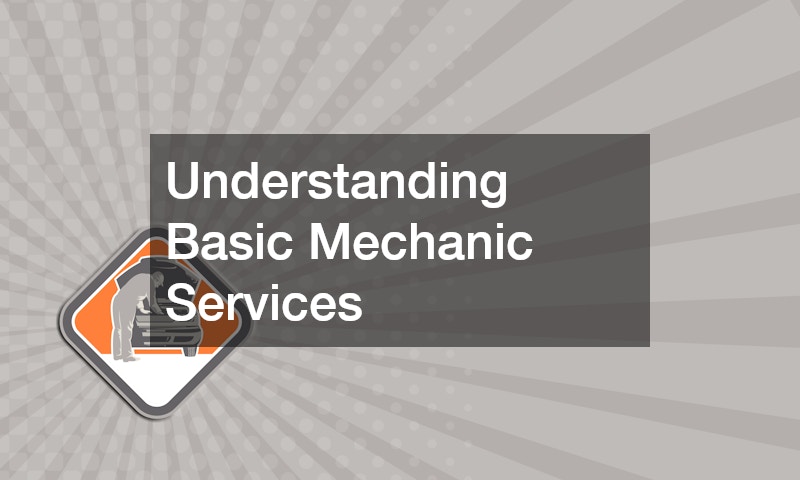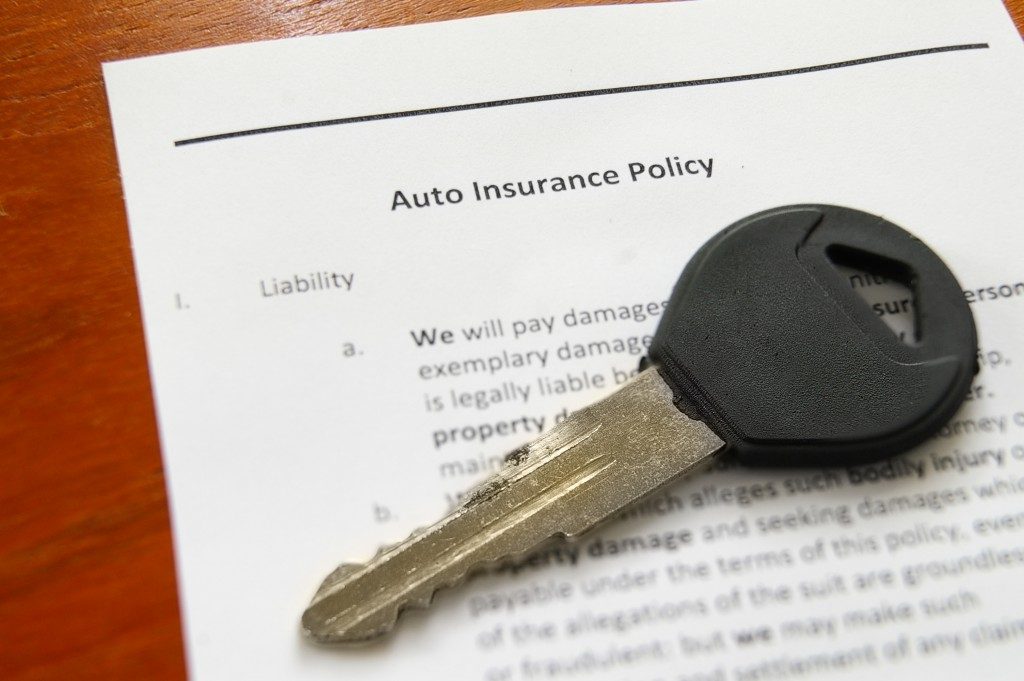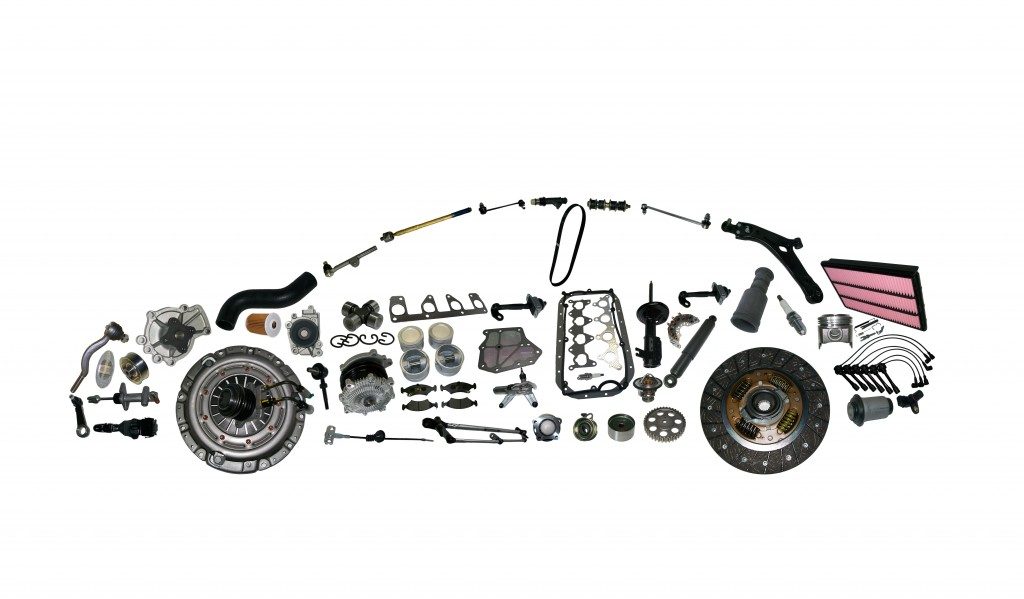Evaluating Your Car’s Basic Needs
When it comes to maintaining a vehicle, understanding the range of mechanic services available is essential for every car owner. Regular care is crucial in ensuring the longevity and performance of any vehicle, whether it’s for daily commutes, long road trips, or professional use. Mechanic services go beyond simple oil changes and tire rotations; they include a variety of specialized tasks that address specific needs. Whether you’re dealing with minor adjustments or extensive repairs, a well-rounded mechanic services list can guide you in selecting the right professionals for the job. For those who are unfamiliar with what to expect from a mechanic, having a clear understanding of available services can help you make informed decisions. In this blog, we will explore some of the most common aspects of mechanic services and what each entails, providing insights into what vehicle owners should expect when visiting a mechanic.

Understanding Basic Mechanic Services
At the heart of any mechanic services list are the basic services that keep your vehicle in optimal running condition. These include oil changes, brake inspections, tire rotations, and routine engine checks. These fundamental tasks are crucial to maintaining vehicle performance, preventing breakdowns, and ensuring that your car runs smoothly on the road. By addressing wear and tear on essential components, basic mechanic services can extend the life of your vehicle and improve its overall efficiency. When regularly maintained, these services ensure that minor issues don’t escalate into larger, more costly repairs.
Specifically, when seeking auto repair services, it’s important to recognize that even the most common repairs may vary depending on your vehicle’s make and model. A mechanic will assess your car’s condition and recommend repairs or replacements based on its current state. For example, older vehicles may require more frequent servicing or part replacements, while newer models might only need basic checks. This personalized approach ensures that you receive tailored solutions, and understanding which basic services your car requires can help you navigate a mechanic services list with ease.
The Importance of Routine Vehicle Inspections
Routine vehicle inspections are a critical component of keeping your vehicle running efficiently, especially when it comes to diesel engines, which operate under higher stress compared to gasoline engines. Inspections can help identify potential problems before they become severe, saving you time and money in the long run. This includes examining the engine, brakes, suspension, and other key parts that are subject to wear. Regular inspections not only ensure that your vehicle is safe for use but also help maintain its fuel efficiency and performance. Diesel mechanics often emphasize the importance of these inspections, as diesel engines require specialized care that differs from standard gasoline engines.
For owners of diesel-powered vehicles, it’s important to seek out mechanics who specialize in diesel mechanics. These professionals have the expertise to spot issues unique to diesel engines, such as injector problems, turbocharger failures, or fuel system malfunctions. By focusing on diesel-specific concerns, a qualified mechanic can provide accurate diagnostics and recommend appropriate maintenance tasks.

Diagnostic Tools and Their Role in Repairs
One of the most valuable resources in a mechanic’s toolkit is diagnostic equipment, which allows them to identify problems with your vehicle quickly and efficiently. From engine diagnostics to checking the electrical system, these tools enable mechanics to pinpoint specific issues and recommend appropriate solutions. Modern vehicles, especially those with advanced computer systems, often require specialized diagnostic tools to ensure accurate assessments. The right tools can detect anything from faulty sensors to more complex problems in the engine or transmission. As part of a mechanic services list, diagnostic assessments play a crucial role in maintaining a vehicle’s health.
In the context of automotive locksmith services, diagnostics also extend beyond typical engine and system checks. For instance, a vehicle’s keyless entry system or anti-theft mechanism may require troubleshooting by an automotive locksmith, who uses specialized tools to identify malfunctions. This is especially relevant for modern cars that rely heavily on electronic components for locking and ignition systems.
How Mechanics Ensure Quality Workmanship
When entrusting your vehicle to a mechanic, quality workmanship is a top priority, and this assurance comes through meticulous attention to detail. Mechanics follow standardized procedures and quality checks to ensure that repairs and maintenance are performed correctly the first time. Whether it’s something as routine as changing a tire or more complex like rebuilding an engine, the commitment to high-quality work ensures that the vehicle is not only repaired but also performs optimally after service. Mechanics use premium parts and tools, follow safety standards, and offer guarantees to stand behind their work, giving car owners peace of mind.
For example, tire services are often taken for granted, but ensuring that the right tires are selected and properly installed is a critical aspect of quality workmanship. Mechanics not only install tires but also inspect for proper alignment, balance, and pressure, all of which directly impact your vehicle’s safety and fuel efficiency. By including tire services on your mechanic services list, you can be confident that your car will handle well on the road, even in challenging conditions.

Common Repair Services Provided by Mechanics
Mechanics provide a wide range of repair services that address both minor issues and major mechanical failures. Common repairs include brake replacements, engine tune-ups, transmission repairs, and suspension adjustments. These services are crucial in maintaining the structural integrity and performance of your vehicle. For vehicle owners, knowing what to expect in terms of common repair services can help in planning routine maintenance and avoiding sudden breakdowns. Mechanics with a broad skill set are essential for performing these tasks efficiently and effectively. Including these common repairs in your mechanic services list ensures that your vehicle will always be in peak condition.
For those who rely on black car services, such as professional chauffeurs or limousine companies, the need for regular repairs and maintenance becomes even more critical. Vehicles used for such services endure high usage and often need more frequent tune-ups, particularly in high-stress components like the engine and brakes. Mechanics who specialize in servicing black cars understand the unique demands of these vehicles and offer tailored solutions to keep them running smoothly.
Communication Between Mechanics and Clients
Effective communication between mechanics and clients is crucial in ensuring that car owners fully understand the work being performed on their vehicles. A professional mechanic will explain the issues found during inspection, outline possible solutions, and provide a clear estimate of costs. Transparent communication builds trust, allowing clients to feel more confident about the services being rendered. Additionally, it provides an opportunity for car owners to ask questions about the process, understand the timeline for repairs, and make informed decisions based on the mechanic’s recommendations. When mechanics take the time to explain their work, it enhances the overall customer experience.
For instance, clients who may also work with a carport company to protect their vehicles often need to understand the relationship between proper storage and vehicle maintenance. A mechanic can offer insights on how factors such as weather conditions or the type of shelter used can affect the wear and tear on a vehicle, which in turn impacts the frequency of maintenance or repairs.

Transparency in Pricing and Service Estimates
One of the most important aspects of working with a mechanic is understanding the cost of services. Transparency in pricing and estimates ensures that customers are not surprised by unexpected charges or fees. Mechanics should provide a detailed breakdown of costs for labor, parts, and any additional fees, allowing clients to see exactly where their money is going. This transparency builds trust and helps clients budget for vehicle maintenance and repairs. Many reputable mechanics will also offer multiple options for parts or services, enabling customers to choose based on their preferences and financial situation. Including clear pricing in the mechanic services list reassures customers that they are receiving fair value.
For specific services such as windshield repair service, transparency is especially crucial. A mechanic will typically provide a detailed assessment of whether a windshield requires repair or replacement, and this will directly influence the cost. Clients need to be aware of the different types of glass available, the labor involved, and how factors like insurance coverage may affect pricing.
The Role of Certifications in Mechanic Expertise
Certifications play a significant role in the expertise and credibility of a mechanic. When a mechanic holds certifications from recognized automotive organizations, it signifies that they have undergone rigorous training and testing to ensure they meet industry standards. These certifications can cover a wide range of specialties, from general vehicle repair to more specific areas like electrical systems or brake services. A certified mechanic brings a higher level of trust and assurance to clients, as they have proven expertise in diagnosing and repairing vehicles. Ensuring that mechanics on your mechanic services list have the appropriate certifications is essential to maintaining high-quality service.
In more specialized services like vehicle wrap installation, certifications are particularly important. A certified technician has the skills and knowledge necessary to apply wraps professionally, ensuring a smooth and durable finish that protects the vehicle’s paint and enhances its appearance. Improper application can lead to costly mistakes, so working with a certified expert ensures the job is done right the first time.
Safety Protocols Followed During Vehicle Servicing
Safety is a top priority in any mechanic’s shop, and strict safety protocols are followed to protect both the mechanics and the vehicles being serviced. From using proper protective equipment to ensuring that vehicles are securely lifted before any work is performed underneath, mechanics adhere to a set of procedures that minimize risks during repairs. These protocols not only protect the technicians but also ensure that the work performed is done in a controlled and safe environment. Mechanics are trained to handle various safety challenges, ensuring that every vehicle they work on is returned to its owner in safe, roadworthy condition. Including safety protocols in a mechanic services list is a key factor in delivering reliable service.
For example, when working on vehicles equipped with modern accessories like a motorized screen, additional safety considerations may be necessary. These components require careful handling to avoid damaging the electrical system or any sensitive mechanisms. Mechanics must be familiar with the specific safety requirements of each component, ensuring that both the vehicle and its added features remain intact.
Post-Service Support and Maintenance Advice
The relationship between a mechanic and a client doesn’t end when the service is complete. Post-service support and ongoing maintenance advice are critical in helping vehicle owners maintain their cars between mechanic visits. This can include guidance on proper care, reminders for upcoming maintenance, and advice on how to handle minor issues before they turn into major repairs. Mechanics who offer post-service follow-ups show that they are invested in the long-term performance of the vehicles they service, providing value beyond the immediate repair. Adding post-service support to the mechanic services list ensures clients know they can rely on their mechanic for continued assistance.
For vehicle owners who may find themselves in unexpected situations, such as breakdowns, mechanics often partner with 24 hour tow trucks to ensure clients have access to emergency services. Mechanics who offer this kind of support understand that vehicle problems can occur at any time, and having access to towing services is crucial. After a vehicle is towed, the mechanic can assess the issue and provide the necessary repairs.
Maintaining Vehicle Repairs
Knowing what to expect from mechanic services can make a significant difference in maintaining your vehicle’s health and longevity. From routine inspections and diagnostics to more specialized services like vehicle wraps and windshield repairs, a well-rounded mechanic services list offers a broad range of options to meet any vehicle’s needs. Safety protocols and certifications ensure that the work is done professionally, while transparent communication and pricing build trust between mechanics and their clients. Additionally, post-service support and emergency options like 24 hour tow trucks demonstrate the commitment mechanics have to their clients, providing ongoing assistance even after the repairs are complete. By understanding the various services available, vehicle owners can make informed decisions and feel confident in the care their vehicle receives.




